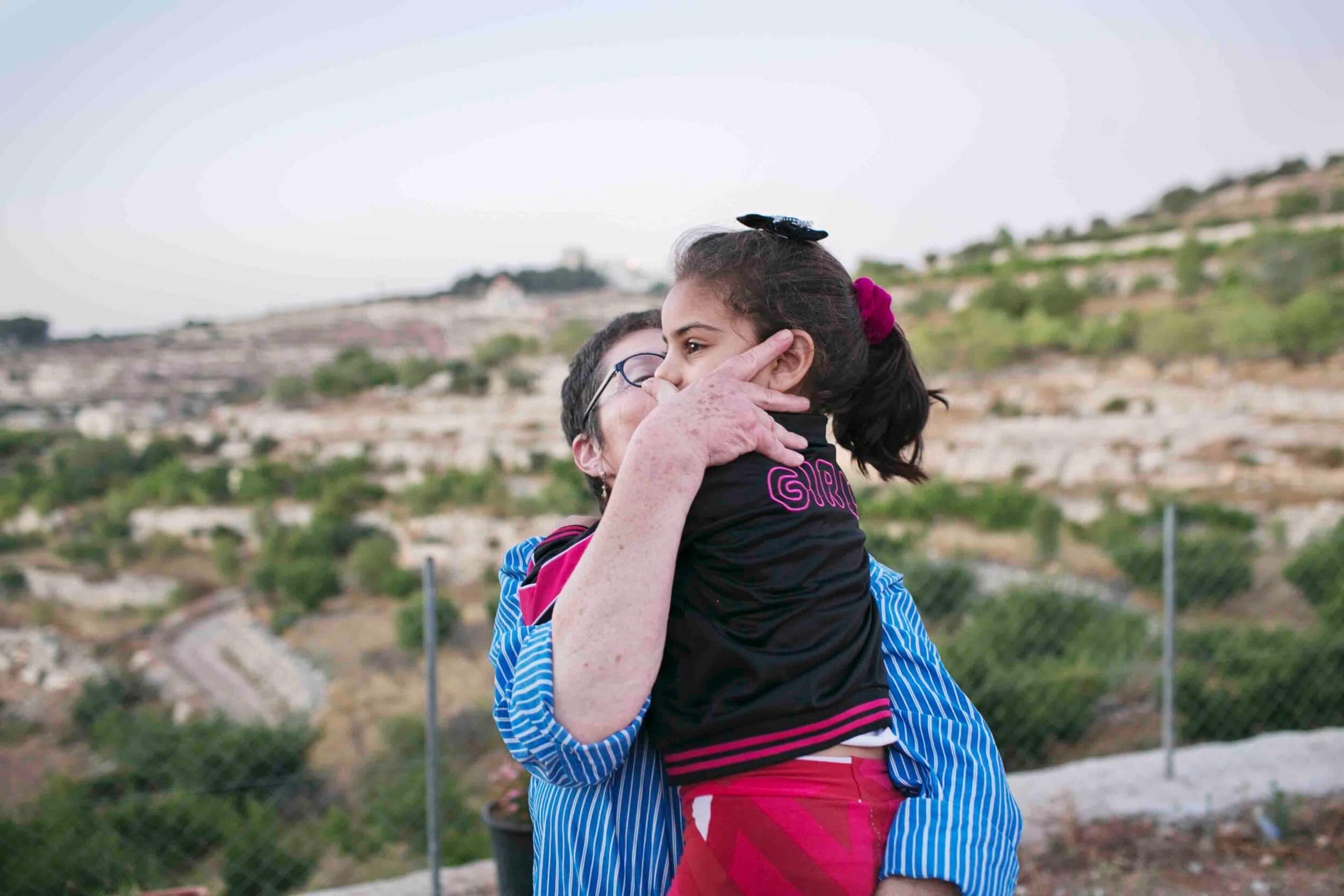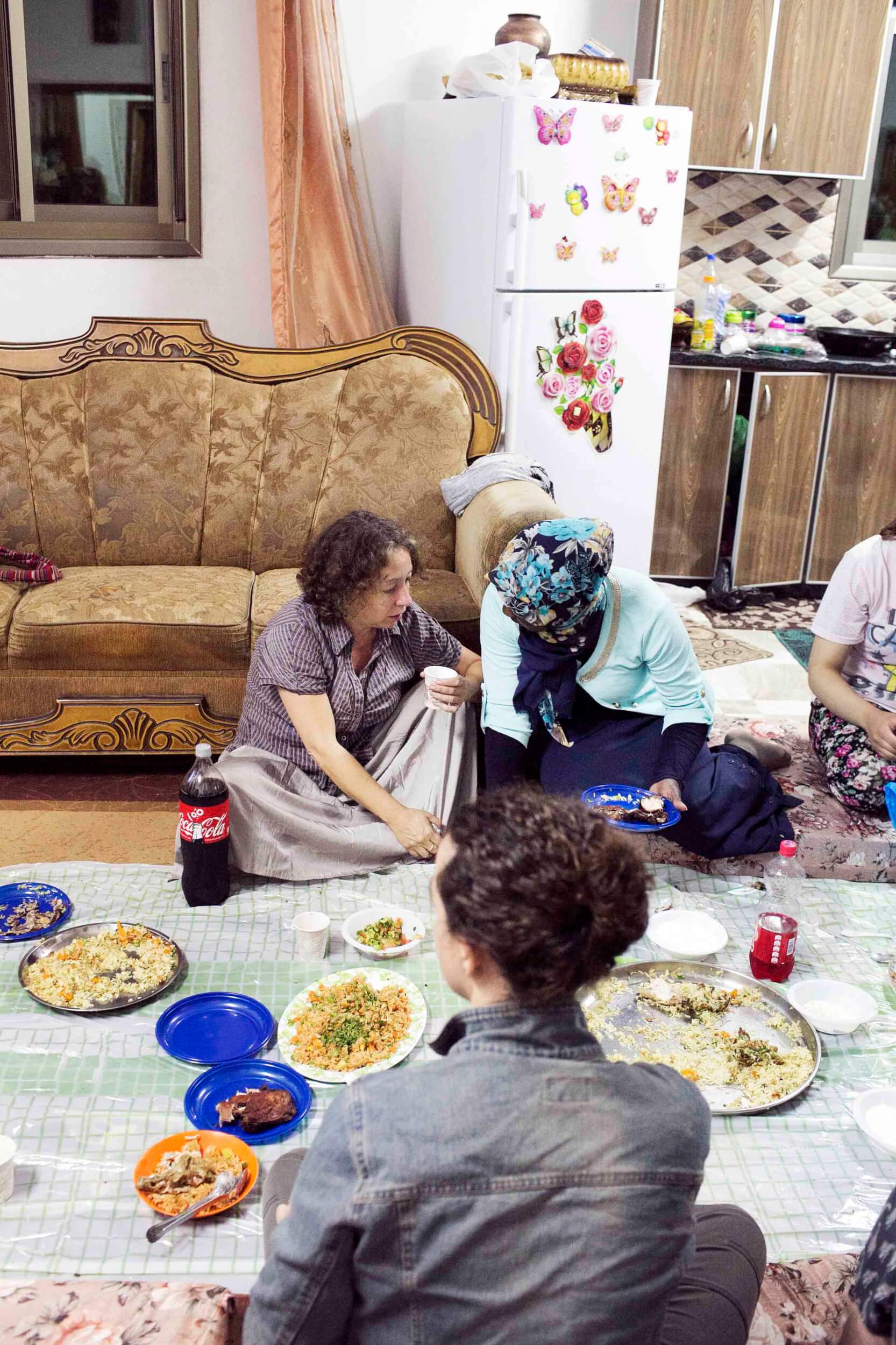At the entrance of Beit Ummar, a red sign in Hebrew, Arabic and English warns Israeli citizens that visiting the Palestinian village could be dangerous for their lives. But on one Saturday evening, four cars with yellow Israeli license plates drive past the warning and a tall military observation tower.
Inside the cars, about fifteen Israeli women, some already past retirement age, are crammed between huge toys for children. The sun is almost setting behind the hills, as the group makes their way through the winding roads. For many of the passengers, it is not their first time in the village. Following the footsteps of an Israeli activist Ilana Hammerman, some of them started smuggling Palestinian women – including from Beit Ummar – for daytrips into Israel.
Hammerman sparked a nation-wide debate in 2010 after she published an article about one such a trip, illegal under Israeli law, on the Israeli daily newspaper Haaretz.
At the end of the village, the group finally reaches the house of Zahra. That is not her real name, though; to avoid troubles, none of the Palestinian women in this article wanted to be identified. In the West Bank, doing anything with the Israelis might come with the derogative label “normalizer”, which is used for people seeking normal relations with the occupying power.
But this dinner is not about discussing the Israeli-Palestinian conflict. With her friends and relatives, Zahra receives the Israelis with hugs and kisses. Some of the activists have learned enough Arabic to answer the greetings, while others just smile at their hosts.
Passing checkpoints without headscarves
Inside the house, the meal is already set. Seated on long mattresses on the floor, the Palestinians fill the plates of their guests with rice, chicken, salads, and yogurt.
“This dish is called maqloube,” Ofra Lyth, one of the long-time activists, tells the other Israeli women about Palestinian cuisine.
A loosely bounded group, all the Israeli women are united by the disappointment at their state’s treatment of Palestinians in the occupied territories. The frustration started already before the current right-wing government headed by Prime Minister Benjamin Netanyahu.
“I’m not bothered with these governments,” Lyth says. “A Labor government would do the same thing, only more politely.”

At the moment, the female activists mostly support the Palestinians’ kindergarten in an attempt to help one small part of Beit Ummar’s economy. But their friendship started when driving the Palestinians to see the land that their grandparents used to live in.
As a result of strict Israeli limitations on Palestinian freedom of movement, even seeing the Mediterranean Sea, about 65 kilometers away, is a distant dream for many residents of the occupied West Bank.
Yet the military checkpoints to cross into Israel are not always foolproof. By wearing Western clothes and leaving their headscarves at home – in other words, by appearing as Israeli as possible – the Palestinians were able to trick the soldiers. Nobody was ever caught for traveling without permission.
Zahra, who made the trip several times, says she really enjoyed the beach in Jaffa and praying at the Al-Aqsa Mosque in Jerusalem. Before the illegal trips, she had seen the mosque, the third holiest site in Islam, only on television.
“It is called Israel, but it is our country. And it is beautiful out there,” Zahra says. She and her husband are both Palestinian refugees from areas belonging to present-day Israel.
“The Israelis call us (the Palestinians) terrorists,” she adds. “But I’m a woman – what would I do there? Nothing. I went there, I did nothing.”
Zahra says she wishes to make the trip again, although the Israeli activists are no longer organizing the visits on a regular basis. Without the right ID cards, the Palestinian women still depend on the will of their friends from other side of the West Bank separation wall.
“Only afraid of the Israeli army”

At the dinner, the all-female group means that some of the Palestinians have taken off their headscarves and walk around the house in T-shirts. Once the coffee and sweets have been served, the women turn the music on and break into dance.
Despite tonight’s joy, Lyth is pessimistic about making a change from inside of Israel, as the activists represent only a tiny minority of the Israeli society.
“I thought that 500 women would join us,” Lyth recalls, sitting on the balcony. “In the end, we were about 40 at maximum.”
Because of the small size of the group, even the Israeli police dropped their investigation on the group’s smuggling activities, Lyth says.
While the group seeks to raise awareness whenever possible, spending time with Palestinians from the West Bank is such a rarity that some of the activists do not even want to tell the truth to their families.
Dafna Kaplan’s mother and sister, for example, have no idea that she is dining tonight in a Palestinian village.
“I don’t tell them, because they would be just worried,” Kaplan says.
“When I’m going to the West Bank, my friends ask me, ‘Are you afraid?’ When I reply that I’m only afraid of the army – the Israeli army – they don’t understand,” she adds.
As the evening turns into night, the Israelis start getting ready to drive back to Jerusalem and Tel Aviv. The Palestinian women cover their hair and walk their guests to the cars, waving at them until the headlights disappear into the darkness of the road.
“There is a major debate within the Israeli left between one-state or two-states solution to the conflict,” Lyth says. “But I believe in one state – I would love to share a state with these people.”



Completely normal life has been and is completely destroyed by Israel. Israel is not normal at all.
Who made up their own rules and laws of Occupation and the ongoing Nakba?
Israel.
Not the Palestinians who “In the West Bank, doing anything with the Israelis might come with the derogative label “normalizer”, which is used for people seeking normal relations with the occupying power.”
I celebrate all of the women who strive for a kindergarten and common cause, but the fact that it is secretive and rife with danger and worry, speaks volumes. It’s sad and criminal that “their friendship started when driving the Palestinians to see the land that their grandparents used to live in.”
This says it all:
““When I’m going to the West Bank, my friends ask me, ‘Are you afraid?’ When I reply that I’m only afraid of the army – the Israeli army – they don’t understand,” she adds.”
End the Occupation. Just stop. Dafna is right to be afraid of the IOF.
Thank you, Anna Kokko.
Just now:
“The Ayalon Highway in central Israel was closed on Thursday afternoon as security forces investigated a suspicious vehicle near the Shalom junction in Tel Aviv.
The police later reported that the car was driven by an Israeli Arab and was carrying two Palestinian women from Gaza. The women were detained for questioning.
The police traffic department reported that the car’s passengers had aroused suspicion when “they did not cooperate with the police” after being stopped for a security check.
The driver of the car was strip-searched in the middle of the highway while police trained their guns on him.
The highway was closed at around 4:00 P.M, leading to heavy traffic jams.”
http://www.haaretz.com/beta/1.669948?utm_source=dlvr.it&utm_medium=twitter
Sure glad I don’t have to live like that.
“A Labor government would do the same thing, only more politely.” –
Great line.
And what a condemnation of Israeli rule it is when it is dangerous and difficult for a bunch of women to get together for dinner!
Such activities are designated the term “normalization”, where Palestinians seek normal relations with their occupiers are given this name because they do not address power relations between Palestinians and Israelis and certainly does not put them on equal footing. These Israeli women are “bestowing their kindness on poor Palestinian women” and focusing their effort on building a kindergarten for them to contribute to uplifting the economy of Beit Ummar (and previously on helping these women access their historical land, doing so in order to wash away the guilt of ethnically cleansing the indigenous population of Palestine almost 70 years ago). These women ought to understand that the “conflict” would not end with ending the occupation over the West Bank (the article does not mention anything of what is happening in Gaza of course and the discrimination Palestinians who did not leave in 1948 face on a daily basis); the right of Palestinian refugees to remain is an inalienable right that will not be given up. These women ought to accept that peace comes with a price and should come to a much overdue conviction and spread this conviction to other Israelis that the price of peace in the long run is more affordable that the destructive consequences of war, aggression and brutality; until this happens, these meetings will remain unacceptable as they will not lead to anything and will help the aggressor, individually and collectively, to white-wash their hands of their guilt.
Great article, but quick (and important) correction:
“In the West Bank, doing anything with the Israelis might come with the derogative label “normalizer”, which is used for people seeking normal relations with the occupying power.”
“Normalization” does not mean “seeking normal relations with the occupying power,” at least that’s not the main thrust of the meaning.
The main thrust of the meaning is making the occupation itself seem normal by interacting publicly with Israelis as if there’s no occupation — as if “both sides” are “equally wrong,” as if things “aren’t really that bad.”
Any interaction with Israelis that understands and specifically condemns the occupation is not considered “normalizing.”
It’s a bit dangerous to say “normalization” means “seeking normal relations with the occupying power.” What most Palestinians want is exactly normal relations with Israelis — normal as in “equal” and “legal.” Implying Palestinians do not want normal relations with Israelis makes it sound a bit like they are the ones refusing peace.
What they don’t want is “pretend” normal relations while the occupation is still ongoing and the Israelis in question are pretending it’s not.